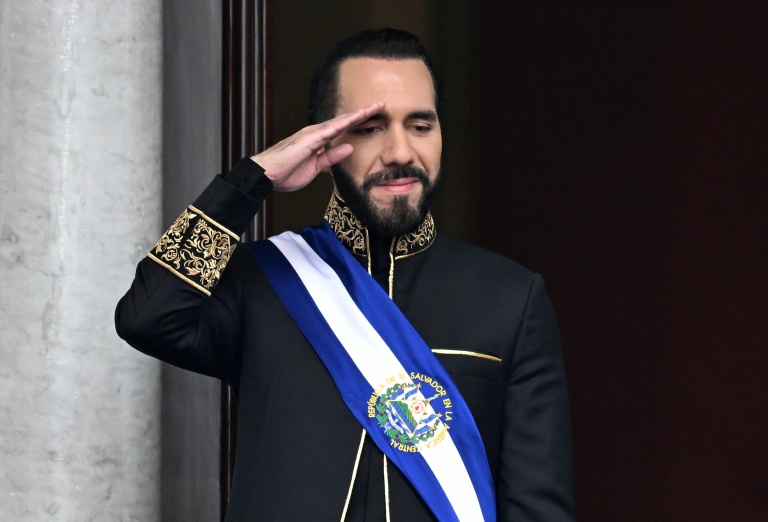World
El Salvador’s President Bukele Expands Power Amid Controversy

Nayib Bukele, the President of El Salvador, has expanded his power through a recent parliamentary vote that abolishes presidential term limits, allowing him to pursue unlimited reelection. Critics express deep concern that this constitutional change paves the way for a more authoritarian regime. Despite these apprehensions, Bukele maintains a high level of popularity both domestically and internationally, largely attributed to his aggressive stance against gangs, a pressing issue in a nation grappling with violence.
Since initiating his crackdown on crime in March 2022, Bukele has overseen the incarceration of nearly 90,000 alleged gang members under a state of emergency that has persisted for over three years. His administration claims this approach has significantly reduced homicide rates, transforming El Salvador from one of the most dangerous countries in the world to what Bukele asserts is now the safest in the Western Hemisphere. Yet, human rights organizations have criticized the campaign for its indiscriminate arrests, including those of minors, and deplorable prison conditions.
During his reelection campaign, Bukele celebrated his achievements, stating, “We changed the murder capital of the world into the safest country in the Western Hemisphere.” He secured a remarkable 85 percent majority in the February 2024 elections, further solidifying his grip on power.
Bukele’s administration has not been without controversy. The former administration of Donald Trump reportedly provided $6 million to Bukele to detain 252 Venezuelans accused of gang ties without evidence at the infamous CECOT facility. These men were recently repatriated to Venezuela after enduring four months of alleged torture and abuse in custody, raising serious ethical questions about Bukele’s governance.
Public Persona and Political Strategy
Describing himself as the “world’s coolest dictator” in a tongue-in-cheek manner on social media, Bukele has effectively utilized platforms like X (formerly Twitter) to connect with supporters. With 7.6 million followers, he engages with the public directly, often communicating in English. Michael Shifter, an analyst at the Inter-American Dialogue, noted that Bukele’s charisma and communication skills are unmatched in Latin America, contributing to a growing cult of personality around him.
His background is as multifaceted as his political strategy. Born in 1981 in San Salvador, Bukele is of Palestinian descent and was described by a former teacher as an “average student.” Though he did not complete his law degree, he transitioned into politics in his early thirties, eventually serving as mayor of both a suburb and the capital before winning the presidency in 2019. His rise disrupted a longstanding two-party system entrenched in corruption since the end of El Salvador’s civil war.
Bukele’s assertive approach to politics became evident early in his presidency. In a dramatic display of power, he sent armed police and soldiers to confront an opposition-led parliament to secure approval for an anti-crime loan. His allies subsequently gained a majority in the Legislative Assembly, allowing for a swift overhaul of the judicial system, including the replacement of senior judges and the attorney general.
Human Rights Concerns and Future Outlook
As Bukele continues to consolidate his authority, many activists and journalists have fled the country due to escalating repression. Recent statements from the president reveal a defiant attitude toward accusations of authoritarianism. “I couldn’t care less if they call me a dictator,” he remarked during a speech in June.
Bukele’s government comprises a close-knit circle, including several family members and former classmates, which raises concerns about nepotism and governance transparency. As El Salvador navigates these turbulent waters, the long-term implications of Bukele’s policies on democracy and human rights remain to be seen.
In the context of rising global scrutiny, Bukele’s administration faces a delicate balance between maintaining public support and addressing the significant human rights issues that have emerged during his tenure. The international community watches closely as El Salvador under Bukele continues to grapple with its identity and future direction.
-

 Politics4 weeks ago
Politics4 weeks agoSecwepemc First Nation Seeks Aboriginal Title Over Kamloops Area
-

 World5 months ago
World5 months agoScientists Unearth Ancient Antarctic Ice to Unlock Climate Secrets
-

 Entertainment5 months ago
Entertainment5 months agoTrump and McCormick to Announce $70 Billion Energy Investments
-

 Science5 months ago
Science5 months agoFour Astronauts Return to Earth After International Space Station Mission
-

 Lifestyle5 months ago
Lifestyle5 months agoTransLink Launches Food Truck Program to Boost Revenue in Vancouver
-

 Technology3 months ago
Technology3 months agoApple Notes Enhances Functionality with Markdown Support in macOS 26
-

 Lifestyle3 months ago
Lifestyle3 months agoManitoba’s Burger Champion Shines Again Amid Dining Innovations
-

 Top Stories2 months ago
Top Stories2 months agoUrgent Update: Fatal Crash on Highway 99 Claims Life of Pitt Meadows Man
-

 Politics4 months ago
Politics4 months agoUkrainian Tennis Star Elina Svitolina Faces Death Threats Online
-

 Sports5 months ago
Sports5 months agoSearch Underway for Missing Hunter Amid Hokkaido Bear Emergency
-

 Politics5 months ago
Politics5 months agoCarney Engages First Nations Leaders at Development Law Summit
-

 Technology5 months ago
Technology5 months agoFrosthaven Launches Early Access on July 31, 2025









